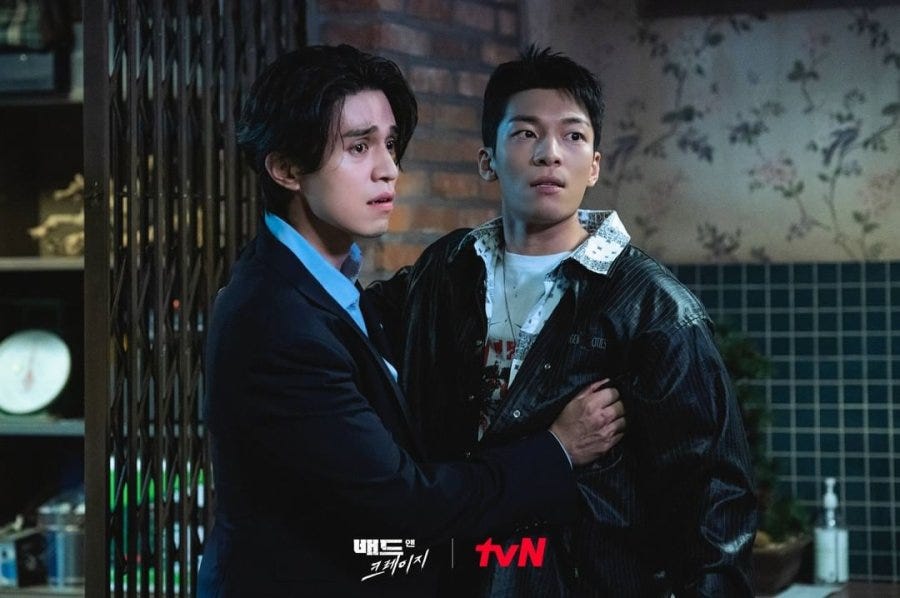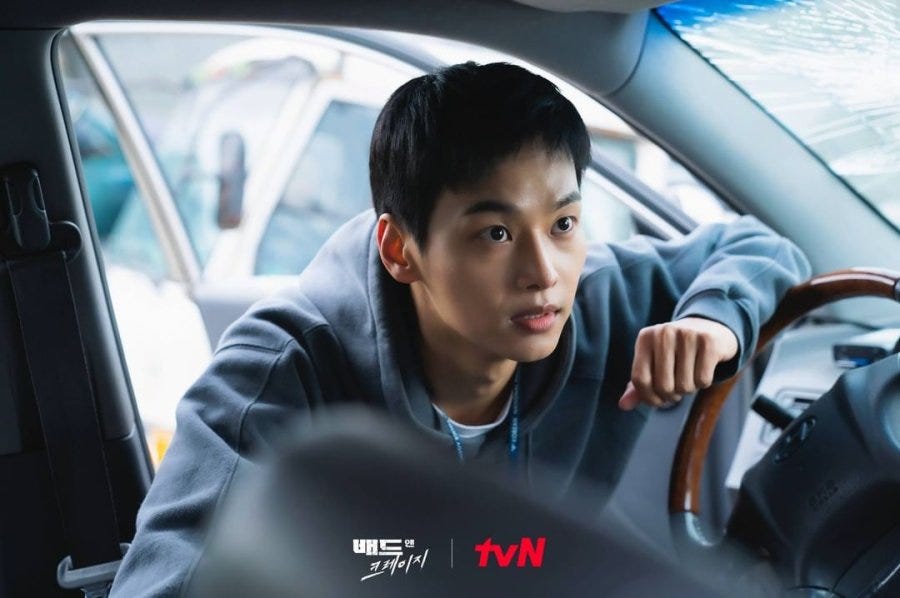Even after watching K dramas for over a decade, I’m always struck by how high production values are for K dramas even when the story is completely off-the-wall and have little compunction about plunging into Wonderland type rabbit holes. On some level Bad and Crazy should have a tough time holding it together with its absurd premise and bendy storytelling but on hindsight keeping it simple stupid was a wise move. 12 episodes with laser-like focus on the lead’s growth arc did the trick. It’s also been a while since I’ve cackled this much watching a K drama despite the entire ride venturing into some extremely dark places.
Bad and Crazy is by no means a great drama but it’s consistently good and… fun. It certainly helps that the dynamic between Lee Dong-wook and Wi Ha-joon works superbly well. Whoever thought about putting these two together had a brain wave. Both undoubtedly have a bent for the comedic and the rip-roaring results speak for themselves. No one even with a cursory knowledge of the subject will think that this is any kind of serious treatment of mental health issues but this zany police procedural positions itself as some kind of fable which is decidedly more Stan Lee than Aesop. Bad and Crazy is unabashedly a superhero story… in fact I would go so far as to insist that it is a superhero origins story.
The other reason why I think the drama works as well as it does it is because the moral universe on which it scaffolds its ideas is fundamentally sound. Yes there’s violence, there’s corruption and evil lurks about wreaking havoc in the form of dirty cops, drug traffickers and a serial killer. However, there’s little doubt that evil is evil and right is right. What’s more the principle of reaping what you’ve sown is well and truly at play. Choices and actions have consequences. While Lee Dong-wook’s Ryu Su-yeol starts off being a bootlicking antihero, his better self, as it were, eventually emerges triumphant. While he and a whole gallery of rogues might be products of their environment and unhappy upbringing, they are held responsible for the terrible deeds they have wrought. At some point Su-yeol has been so corrupted by the system to the degree that his own conscience (whatever’s left of it) has had to work overtime to bring him back onto the straight and narrow.
Truth be told, it’s been a while since I heard or thought about Mariah Carey’s “Hero”. While watching the finale, however, the 1990s hit song intruded unexpectedly into to my consciousness. It’s almost as if someone came up with this K drama story while Carey’s vocal cords were blasting in the background.
And then a hero comes along
With the strength to carry on
And you cast your fears aside
And you know you can survive
So when you feel like hope is gone
Look inside you and be strong
And you'll finally see the truth
That a hero lies in you
For those who are finding all this schmaltzy talk unbearable and are retching at the thought, I will simply add that there’s a feel good element to the drama despite the brutal acts of violence. To say that Ryu Su-yeol is the epitome of the reluctant hero is an understatement. In reality he is dragged kicking and screaming into this hero’s journey and in the course of experiencing it through circumstances beyond his control, he wrestles with his deepest flaws and finds his way back from the brink — not of death but of becoming a villain in a much bigger story.
The fascinating part of his journey of course is that he can’t do it all by himself. Like Alice, he first has his White Rabbit moment in the form of Oh Kyung-tae (Cha Hak-yeon) a straight arrow junior officer who leads him down the hole into fire and darkness and gradually to the light of redemption. Each obstacles he has to overcome is about him facing his demons with resonances of Sun Wukong of the Journey to the West fame: The corruption of his own soul, his lack of integrity, his cowardice when backed into a corner, the past he doesn’t want to remember and his insatiable need to climb the ladder of success. These challenges arise as he navigates the swamp while he’s forced repeatedly to do what is right despite no benefit to his person — to act justly because it is the right thing to do.
Alongside Yu-seol in his quest, is longtime, long-suffering partner Yang Jae-seon (Cha Shi-won) to support him even when the latter believes that his colleague has finally lost the plot. Also on the job is an old flame, Lee Hui-gyeom (Han Ji-eun) a rough operator from the narcotics squad who is sceptical initially but softens as the new man emerges from his metamorphosis. The all-round good guy Oh Kyung-tae becomes a permanent fixture in the anti-corruption team and his bromance with his seniors are some of the best parts of the show. Then there’s the mysterious K who seems to have bats sheltering in his belfry and whose instincts are to hit first and ask questions later.
Considering that this is a superhero show, villains are definitely on the menu and there are an assortment of them from the planners to the foot soldiers. It’s not always easy to keep up with all of the names because of the speed at which the show moves but there are flashbacks to help with that. Since this is really about the hero’s journey, villains are destined to be the support act here.
At the end of the day it’s all about viewer expectations and preferences about this idiosyncratic mixing of genres. No doubt aspects of it require a great deal of suspension of disbelief but if one can do that for the duration of the show, it’s guaranteed entertaining fare.







That was a joy to read....as was your piece on Cupids Kitchen. Thanks, looking forward to more.